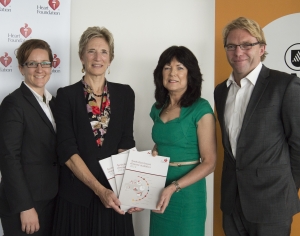Statistics reveal the heart of the nation
Research news
Medical breakthroughs, such as heart stents and bypass surgery, have transformed heart disease treatment over the past 50 years.
Yet cardiovascular disease remains Australia’s biggest killer - and Deakin University researchers and the Heart Foundation are warning that the nation could be experiencing the calm before the storm.
In the most comprehensive set of statistics on cardiovascular disease ever compiled in Australia, some worrying trends have been revealed, with obesity levels, sedentary lifestyles and poor nutrition at an all-time high.
Recently launched at Deakin’s Geelong Waterfront campus, the “Australian Heart Disease Statistics 2014” compendium was funded by the Heart Foundation and compiled by researchers from Deakin’s Population Health Strategic Research Centre.
The statistics were compiled from a national audit of 109 data sources, including databases at the Australian Bureau of Statistics.
The lead researcher, Deakin’s Dr Melanie Nichols, said that, while smoking has declined, other risk factors have increased, such as low vegetable consumption and obesity, with almost two thirds of Australian adults now either overweight or obese.
“There are around 44,000 deaths annually from heart disease in Australia, which is about 30 per cent of all deaths,” Dr Nichols said.
“But the burden is not shared equally, with Aboriginal and Torres Strait Islanders up to three times more likely to suffer heart disease, and rural and regional Australians, and people from lower socioeconomic groups also at greater risk.”
Mary Barry, National CEO of the Heart Foundation, said cardiovascular disease remains the biggest killer of Australians and is the most expensive disease to treat nationally.
“It only accounts for 11 per cent of direct healthcare expenditure and, sadly, remains a national health priority in name only,” Ms Barry said.
She added that, with 35 per cent of the Australian diet now being made up of discretionary or ‘sometimes’ foods, this document is a must-read for all politicians and policy makers.
The report shows that fewer than 10 per cent of Australians meet recommended guidelines for vegetable consumption (five or more serves per day), only 30 per cent of children meet physical activity recommendations, and only 10 per cent of children meet both physical activity and screen-time recommendations.
Dr Nichols said the compendium will be updated annually, providing the evidence needed to support a national strategy to address the unhealthy trends.
“If there is no data, it is easier to believe there is no problem or need for action,” she said.
While it seems like a mammoth task, Dr Nichols is optimistic the trends can be reversed.
“It is possible to make changes, as we have done with tobacco,” she said. “One of the lessons we learnt from tobacco control is you don’t make improvements just by shouting at people. You have to make it easier for people to make a good choice, by making healthy food available and affordable, for instance.”
Another co-author of the report, Deakin’s Professor Steven Allender, added that obesity in children was of particular concern, with one-quarter of children aged two to 17 classified as overweight or obese, and these weight issues likely to continue into adulthood.
Deakin’s Population Health SRC focusses on delivering health improvements through world class research and strategic collaborations. It encompasses five core research groups, including the World Health Organisation (WHO) Collaborating Centre for Obesity Prevention, which is overseeing the Heart Disease Statistics Project for the National Heart Foundation of Australia.
“Australian Heart Disease Statistics 2014" can be downloaded from the Heart Foundation website.
Share this story
 At the launch of the Compendium: Dr Melanie Nichols, Deputy Vice-Chancellor (Research) Professor Lee Astheimer, and Prof Steven Allender, with the Heart Foundation CEO, Ms Mary Barry (second right).
At the launch of the Compendium: Dr Melanie Nichols, Deputy Vice-Chancellor (Research) Professor Lee Astheimer, and Prof Steven Allender, with the Heart Foundation CEO, Ms Mary Barry (second right).
